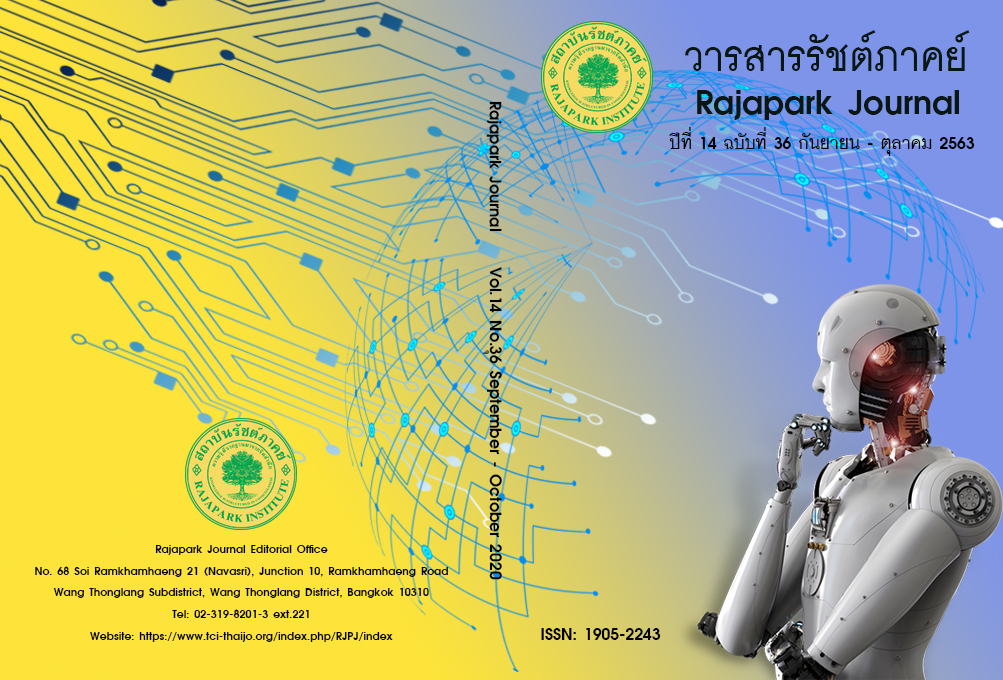Regulatory Measures for Security Token Offering on the Blockchain
Main Article Content
Abstract
The objectives of this research were 1) to study the generality of digital token in the category of securities including process of security token offering (STO) through the blockchain; 2) to study regarding the categories and the general working principles of the blockchain; 3) to analyse Securities and Exchange Act B.E. 2535 (1992), relevant regulations, and other legislation regarding Initial Public Offering (IPO) in Thailand including laws and regulatory measures relating security token offering through the blockchain in Singapore and Switzerland; 4) to analyse problems which may arise from application of Securities and Exchange Act B.E. 2535 (1992), relevant regulations, and other legislation regarding security token offering through the blockchain together with to conduct a comparative study with the regulatory measures in Singapore and Switzerland; 5) to propose suitable solutions for solving problems and finding guidelines to stipulate the regulatory measures for security token offering on the blockchain for supporting and controlling the fundraising applied with technology in digital age effectively. In this research, qualitative research was conducted through documentary research. The result was found that a security token was in accordance with the definition of “Securities” under Securities and Exchange Act B.E. 2535 (1992). However, the law on securities and other legislation as well as relevant rules thereunder appear inappropriate and insufficient for regulating security token offerings. In addition, the need to reduce procedures involving the issuer of security tokens and investors on the blockchain entails our reconsideration of rules of law so that their application should be reduced to the extent necessary for the achievement of the purposes of the application of a blockchain system to security token offerings including the law and related regulations are not in accordance with features of platform providers and securities companies which provide services on the blockchain.
Article Details
Views and opinions appearing in the Journal it is the responsibility of the author of the article, and does not constitute the view and responsibility of the editorial team.
References
Digital Government Development Agency (Public Organization) (DGA). (2019). Blockchain for Government Services. Bangkok: DGA. Retrieved March 28, 2020, from https://www.dga.or.th
Drescher, D. (2017). Blockchain Basics: A Non-Technical Introduction in 25 Steps. Berkeley: Apress.
Noipanya, T. (2018). The Law of Bitcoin, Blockchain, ICO and Etc. with the explanation of Digital Asset Business Act 2018. Bangkok: Winyuchon.
Ruamrangsri, S. (2018). Supervisory and regulatory framework for initial coin offering to support the development of digital economy strategy and policy. Bangkok: The Security and Exchange Commission.
Security Token Working Group of Swiss Blockchain Federation. (2019). Circular 2019/01 Tokenized Equity Guidelines for Issuers of Equity and Related Tokens. Retrieved March 30, 2020, from http://blockchainfederation.ch/wp-content/uploads/2019/12/SBF-Circular-2019-01-Tokenized-Equity-4.pdf.
Swiss Blockchain Taskforce. (2018). Position paper on the legal classification of ICOs. Retrieved March 28, 2020, from https://www.mme.ch/fileadmin/files/documents/MME_Compact/2018/180604_Blockchain _Taskforce_Position_Paper_Legal_Engl..pdf.
The Chain Partners. (2019, February 25). Security token (STO) analysis. Retrieved March 5, 2020, from https://www.finyear.com/attachment/1338789/


